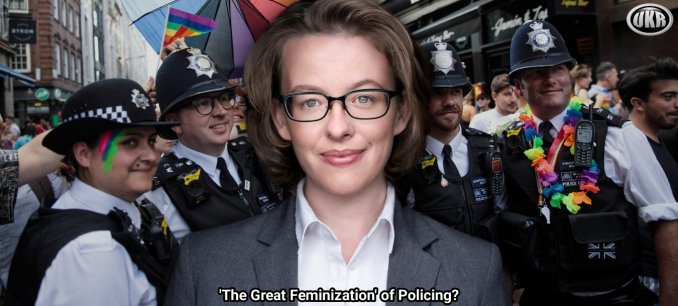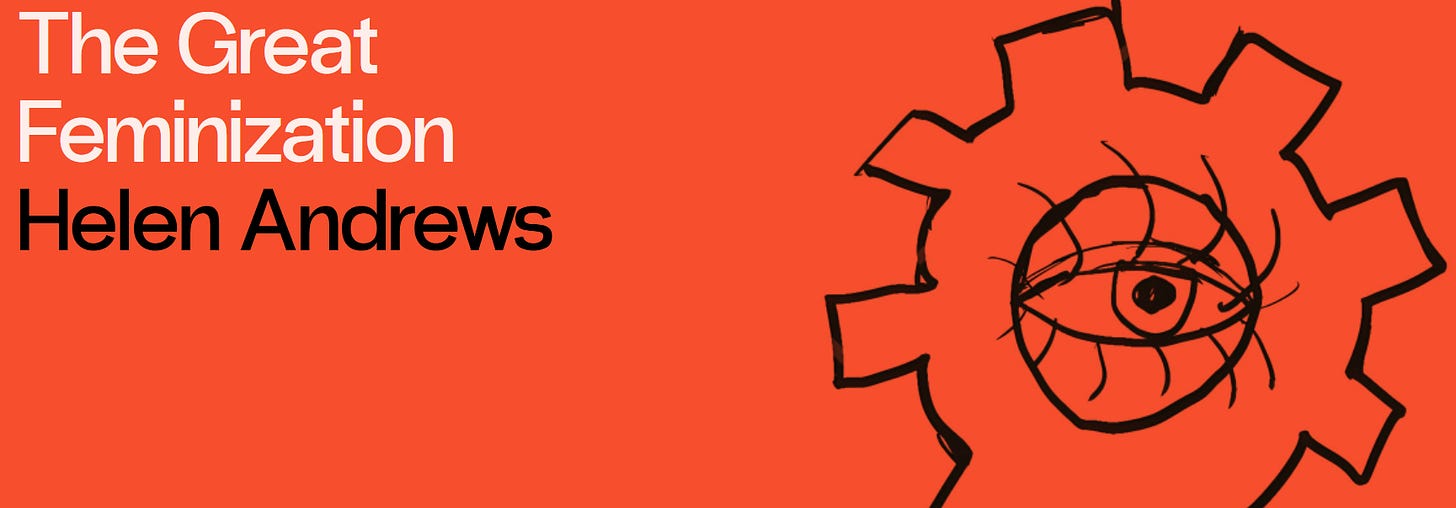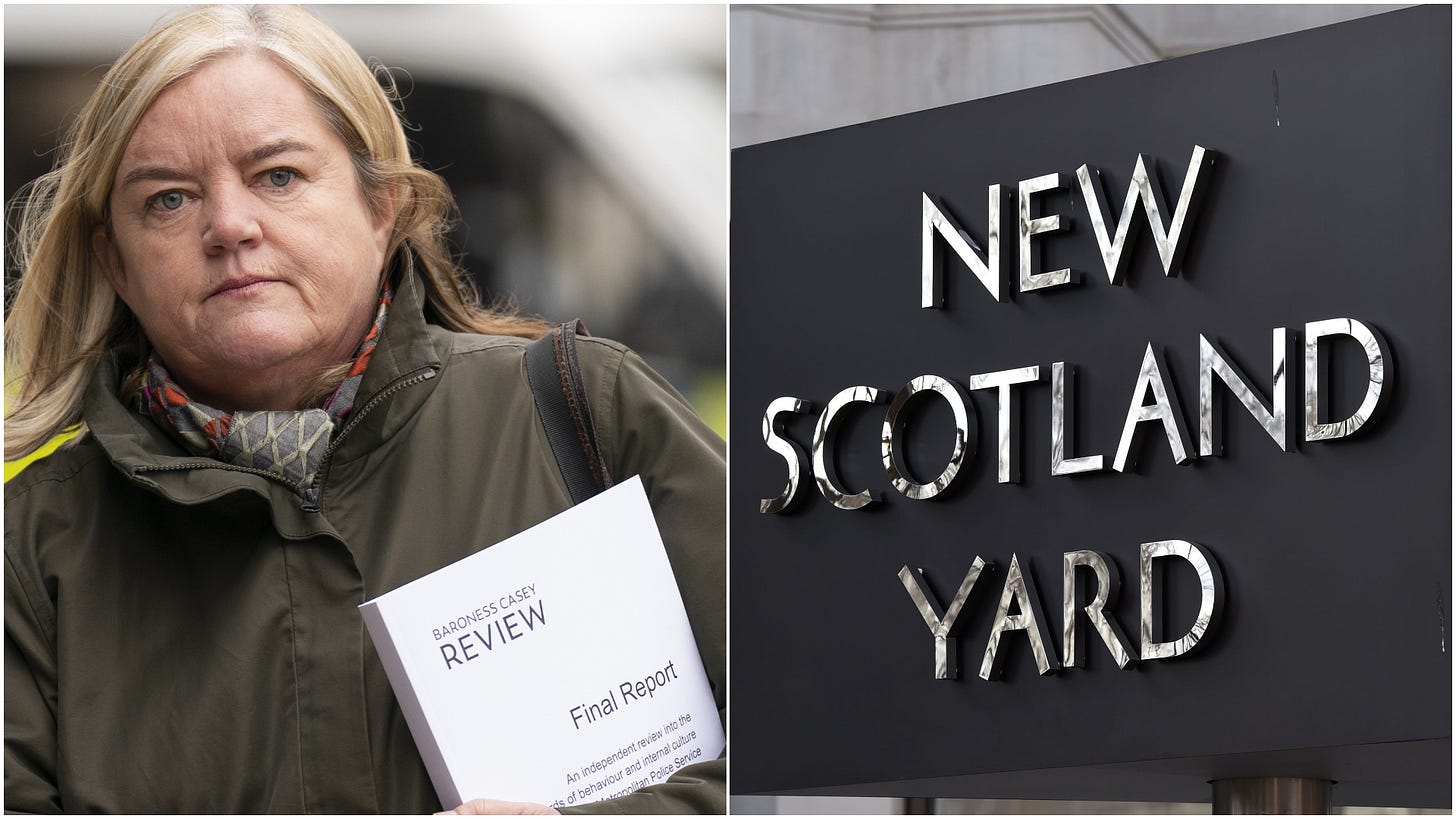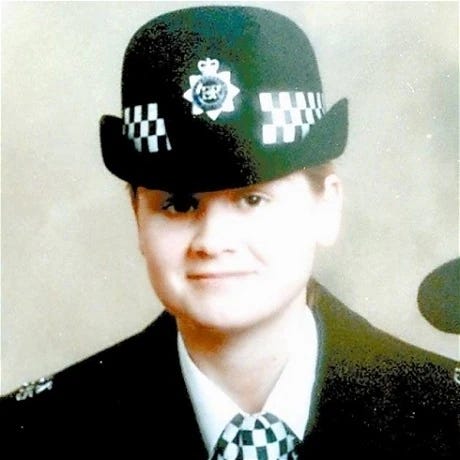
Helen Andrews, Women and The Police

Helen Andrews’ grenade, dropped into the internet hive-mind.
DOMINIC ADLER
The conservative journalist and author Helen Andrews recently dropped a culture war hand grenade – an article called ‘The Great Feminization’. So what, you ask? Right-wing journalists are supposed to drop culture war hand grenades. It’s their job. This is a ‘dog bites man’ story, right?
Perhaps. What interested me, though, was the response. Rather than her dodging a hail of abuse, people began actually debating Andrews’ ideas. The essay lit up the internet like a high wattage light bulb. Perhaps we’re emerging from the gloomy tunnel of social justice maximalism we’ve been trudging through for the past decade.
What, then, has Andrews said? I’d encourage you to read the article (linked above). It isn’t particularly long. The gist?
‘Wokeness is not a new ideology, an outgrowth of Marxism… it is simply feminine patterns of behavior applied to institutions where women were few in number until recently. How did I not see it before?’
And;
The substance fits, too. Everything you think of as wokeness involves prioritizing the feminine over the masculine: empathy over rationality, safety over risk, cohesion over competition.
And this made me chuckle:
Women can sue their bosses for running a workplace that feels like a fraternity house, but men can’t sue when their workplace feels like a Montessori kindergarten.
I did some digging for statistics around (a) the number of women – serving at all ranks – in UK police services in 1995 and (b) representation of female officers in senior ranks during the same period (i.e. assistant chief constable and above).
Then I looked at a similar dataset for 2025. The figures are, I would suggest, impressive. They suggest tangible progress in female representation, of the sort only achievable via determined social engineering:
- Female officers (all ranks): 13–14 % in 1995 versus 36 % in 2025
- Female chief officers: 3 % in 1995 versus 35–40 % in 2025
So yes. I’m gonna go there. I’m a man. Discussing women. In the police. Baroness Casey – look away now!

Louise Casey. I agreed with much of her report into the Metropolitan Police. Then she declared armed policing, for example, toxically macho. Everyone credited with working on her report was… female. Hmmm.
How much of Helen Andrews’ argument could we apply to the decline of British policing?
I’m no expert on Feminism – besides, over the past forty years feminism’s had more reincarnations than Doctor Who. The transgender debate saw gnarly left-wing lesbians jumping in trenches hitherto occupied by conservatives, after all.
I’m more or less agnostic on this specific aspect of the culture war. I don’t consider myself a male chauvinist pig. I’ve written about the Met’s failures in tackling sexual abuse against female officers. I would have happily seen Wayne Couzens hanged. Most of the specialisms I worked in were ‘co-ed.’ I was hardly your typical door-kicking, rugby-playing, gym-attending blokish copper.
However, I did see the Diversity Agenda in action. A revolution, and revolutions require bogeymen. Quite literally in this case. Bogeymen. Yes, some officers with ‘protected characteristics’, the Robespierres of DEI, were over-promoted. Tokenism was real. To voice concerns invited disciplinary action, even though it was an unspoken truth (a subject over which senior officers would sigh and shrug their shoulders, in private, as they often did). It was authoritarian. Reasonable concerns around fairness were spun into oppression against colleagues.
And, perhaps most damning of all, real sexism remained unchecked.
That, presumably, was tougher than putting up posters and organising buffets.
It couldn’t last, and it hasn’t. Revolutions devour themselves. Newton’s Second Law of Physics applies to culture and politics, too. Which is to say, to every action there’s an opposite and equal reaction. Which, I suppose, takes us back to Helen Andrews. So I’m going to discuss her theory through my, er, ‘lived experience.’ Not as a high-flier, just as a grunt who observed the rise of the senior female copper.
To what extent did ‘Feminization’ explain the social justice hysteria that brought policing to its knees? What was the impact, if any, of forces denying patently obvious gender differences?
Perhaps the most obvious example, if you’re an operational police officer, is violence. Strip policing down to its core and you’ll find a fundamentally coercive activity.
It’s 1993. I’m sitting in a grubby police canteen. We’re discussing genuinely shocking news. As in end-of-the-world shocking. ‘Have you heard what they’re doing in Chelsea?’ said a long-service constable. ‘They’ve only gone and posted two birds in their area car.’
‘No!’ we replied, clutching notional pearl necklaces. ‘Two birds? What happens if they’re first on scene at a pub fight?’
‘Exactly,’ said the sweaty old Pc. ‘The Job’s fucked.’
Times changed. For starters, women had force multipliers like CS spray and tasers – whereas back in 1993, the police was all about hand-to-hand fighting. Anyhow, by the time I retired in 2018 – and I kid you not – such a conversation would have been actionable.
A disciplinary offence.
Then, back to the future! in 2025, Reform MP Sarah Pochin (Shadow Spokeswoman for Winding Up The Guardian) declared:
“I never feel comfortable actually seeing two female police officers together. I’d much rather see a great, big, strapping male police officer with a female.”
This led to, as you can imagine, even more pearl-clutching. Yet, Pochin was clumsily articulating what people were saying in pubs and cafes outside the M25. This was, I noticed, during the aftermath of the controversial Manchester airport incident. An incident where a female officer was beaten up by two highly aggressive, and much larger, men.
That officer was clearly brave. She put herself out there. She got involved. Many people, male or female, would choose not to. So I’m not talking about courage. I’m talking about evolutionary biology, which isn’t politically-correct. I am well aware – and have witnessed – how female ‘soft’ skills can defuse conflict. I’ve also seen how they can make no difference whatsoever. There’s no reasoning with ‘The Angry Man.’
Where, then, is the bottom line? What’s the base level of physical strength we demand of first-responders? Should front-line policing be a specialization? Those standards should apply, equally, to men and women. Then there are policing roles – the majority of non-response work in fact – where gender differences are either marginal, or completely irrelevant.
There are many brave policewomen. Simply putting on a yellow hi-viz jacket and patrolling a British high street on a Friday night? That’s brave in and of itself. Female police officers have died or been seriously injured on duty.

Bravery: Pc Nina Mackay, 25. In 1997, Nina was serving on the Territorial Support Group when she was stabbed to death by a suspect in east London.
Of course, some women are outliers. Easily capable of the most challenging roles. Anyone who’s served in the police has met them. They often face discrimination from old boy’s clubs. Some of this is unambiguously sexist. Occasionally it’s caused by a suspicion women – even capable women – are the thin end of a wedge, ultimately designed to diminish standards. This is often driven by senior officers with no operational experience of the roles they wish to ‘reform.’
Admittedly, I’m discussing a small handful of high-profile, kinetic policing roles. We can talk about gender equality, in the abstract, all day. Then we could select a random sample of female public-order trained officers, form an all-woman riot squad and deploy them against a mob of angry men.
My views are straightforward. I also suspect they’re fairly mainstream. The police are the public, and the public are the police. There should be no roles in policing closed to women, unless specifically forbidden by law – as long as agreed standards are met. This isn’t a game. It’s protecting life and limb.
As for culture? I agree toxic old boy’s clubs need nuking. On the other hand? Women working in predominantly male environments should also engage in give or take. Remember Helen Andrews’ Frat House / Montessori comment?
Sadly, everything in policing became a zero-sum game, one where senior officers saw advancement opportunities in promoting ‘trailblazing’ and blowing-up applecarts. I’ve seen bosses who were obsessed with increasing representation of group ‘a’ or ‘b’ in certain roles – and operational performance be damned. They were moving on anyway, not really caring what flaming dumpsters they left behind.
For example, look at the number of female senior officers parachuted into armed policing, without ever touching a gun (these were, allegedly, the most toxic and male units). Why? So they could put ‘led a firearms command’ on their CVs. Remember, these were places where monsters like Wayne Couzens festered.
Some people only ever fail upwards.
Now, the ideological terrain has shifted. The debate over transgendered athletes, for example, has caused even the most left-wing feminists to acknowledge gender differences in sports such as swimming, cycling and boxing. Evolutionary biology has re-entered the chat, after a period in the sin-bin.
Perhaps we can apply this logic elsewhere, too?
Thus Helen Andrews argues a female-led culture of kindness and inclusivity and unicorns-dancing-on-rainbows is to blame. I suspect she might have a point. But not the point.
After all, during this era of alleged feminine ascension, weren’t the people in charge primarily men?
As I saw more women achieve high rank, I noticed the organisation change. Some of this was positive. In departments with investigative and intelligence responsibilities, the women I worked with were usually a breath of fresh air. Two of my (female) bosses were easily the best I ever worked for. They, yes, were more sympathetic and better at managing welfare issues. They were also more than capable of doing the hard yards of operations. They would, privately, roll their eyes at the DEI brigade. They had no need of them. They disapproved of opportunists jumping on the equality bandwagon, especially the nakedly ambitious. Those with a marginal interest in actual policing, instead enjoying a career of state-subsidized activism. Others included men who didn’t give a shit about equality – they merely saw the cause as a vehicle for their personal advancement.
I’ve written extensively on institutional capture. There are tasters here and here. I also address the issue in my obituary of Sir Ian Blair, who arguably led the charge of turbo-wokery in British policing. It’s why I suspect I’m not convinced by the totality of Andrews’ argument. Men were part of the revolution, too.
Instead, is it a case of chicken-and-egg? What was/ is the precise relationship between the evolution of critical theory, feminism and intersectional politics? What do feminists consider their contribution to be? Osmosis, or takeover? Or is it, perhaps, an unholy alliance of political hacks, inadequates, activists and opportunists?
To me, this felt more like a campaign of subversion, aided and abetted by a fellowship of useful idiots and fellow travelers. A campaign which divided officers more than uniting them. Enforced equality-by-diktat tends to have that effect – ask anyone who lived in Eastern Europe before 1989.
My female friends and colleagues, as far as I could tell, wanted pretty much the same as the men. They wanted do police work, be treated fairly and go home at the end of their shift. As constables and sergeants, we were aware rank was far more significant than gender – both men and women can be horrible, merely in different ways.
Although, having said that, I witnessed female bosses adopting masculine tropes as part of their management style. Two of the most unpleasant senior coppers I ever had the misfortune to meet were women. I can put my hand on my heart, though, and say I never thought their gender was the primary issue – they were simply sociopaths.
So, as for Helen Andrews? Yes, I suppose hyper ‘feminization’ was an important part of the woke puzzle. But not all. Not by a long chalk. The entire social justice crusade – all of it – was a full-spectrum attempt to hammer utopian aspirations into stubborn reality. A delusion. A St. Vitus’s dance of leftist folly. A bid to create a police force for the world they wanted, not the one that existed.
Someone else will have to clear up the mess they left behind.
You see, as I mentioned earlier, I agree with much – although not all – of Louise Casey’s report. Change is required. It simply isn’t the change she describes. After all, we’ve had a generation of very senior female police officers. They preached about change – incessantly – but seldom implemented it. Not properly. Or genuinely fairly.
Why? They were too busy getting promoted, of course.
Just like the boys.
This article (‘The Great Feminization’ of Policing?) was created and published by Dominic Adler and is republished here under “Fair Use”






Leave a Reply